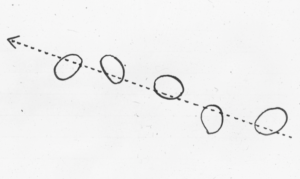The genomic landscape of mammal domestication might be orchestrated by selected transcription factors regulating brain and craniofacial development
Development Genes and Evolution 233 (2), 123-135 Domestication transforms once wild animals into tamed animals that can be then exploited by humans. The process entails modifications in the body, cognition, and behavior that are essentially driven by differences in gene expression patterns. Although genetic and epigenetic mechanisms were shown to underlie such differences, less is […]
By Antonio Benítez-Burraco, Serge Nataf, Juan Uriagereka
August 8, 2023
Features, categories, and interactions within levels
Consonant and vowel categories, differing in distinctive features, interact into projected syllables. Noun and verb categories, also differing in distinctive (categorial) features, interact into projected phrases. Phrases to categorize (via featural distinctions of the A/A’, head/maxP sort) and interact into chains, thus regarded as super-projected structures. What is less obvious is whether these distinctions – […]
By Juan Uriagereka
May 10, 2023
Correlated attributes: Toward a labeling algorithm of complementary categorial features
Frontiers in Language Sciences 2, 1107584 Classical syntactic features are revisited from an algebraic perspective, recalling a traditional argument that the ±N vs. ±V distinction involves correlated, conceptually orthogonal, features, which can be represented in the algebraic format of ±1 vs. ±i complementary elements in a vectorial space. Coupled with natural assumptions about shared information (semiotic) systems, such a space, […]
By Juan Uriagereka
February 20, 2023
Categories with complements
Philosophies 7 (5), 102 Verbs and nouns gear θ-dependencies, Case, agreement, or construal relations. Building on Chomsky’s 1974 decomposition of such categories into ±N, ±V features, by translating said features into ±1, ±i scalars that allow for the construction of a vector space, this paper studies the possibility of organizing said features into 2 × 2 […]
By Juan Uriagereka
September 15, 2022
La física del lenguaje
ReGrOC. Revista de Gramática Orientada a las Competencias 4 (1), 62-71 En este artículo resumimos brevemente y de manera no técnica varios avances recientes en el estudio del lenguaje desde la perspectiva de la física. En particular, comentamos resultados referentes a la equivalencia entre MERGE y renormalización, así como de la teoría de Matrix Syntax. […]
By Román Orús, Juan Uriagereka
May 28, 2022
Off the Chain
Minimalism has no agreed-upon approach to chains. The key problem, as noted by Collins & Groat (2018), is that an all-you-need-is-MERGE logic (Chomsky 2008, Chomsky et al. 2019) is not enough to distinguish repetitions (selected from the Lexicon) from copies (taken from the derivational workspace that carries the computation). Chomsky (1995, 2000, 2001), for instance, […]
By Ángel J. Gallego, Juan Uriagereka
October 20, 2020
Towards Matrix Syntax
Catalan Journal of Linguistics, 27-44 Matrix syntax is a model of syntactic relations in language, which grew out of a desire to understand chains. The purpose of this paper is to explain its basic ideas to a linguistics audience, without entering into too many formal details (for which cf. Orús et al. 2017). The resulting […]
By Roger Martin, Román Orús, Juan Uriagereka
December 23, 2019
The MER41 family of HERVs is uniquely involved in the immune-mediated regulation of cognition/behavior-related genes: pathophysiological implications for autism spectrum disorders
Frontiers Genetics 321, vol 10 Social behavior and neuronal connectivity in rodents have been shown to be shaped by the prototypical T lymphocyte-derived pro-inflammatory cytokine Interferon-gamma (IFNγ). It has also been demonstrated that STAT1 (Signal Transducer And Activator Of Transcription 1), a transcription factor (TF) crucially involved in the IFNγ pathway, binds consensus sequences that, […]
By Antonio Benítez-Burraco, Serge Nataf, Juan Uriagereka
April 12, 2019
Intentionality and Domestication
Workshop on Biolinguistics, University of the Balearic Islands.
By admin
January 11, 2019








